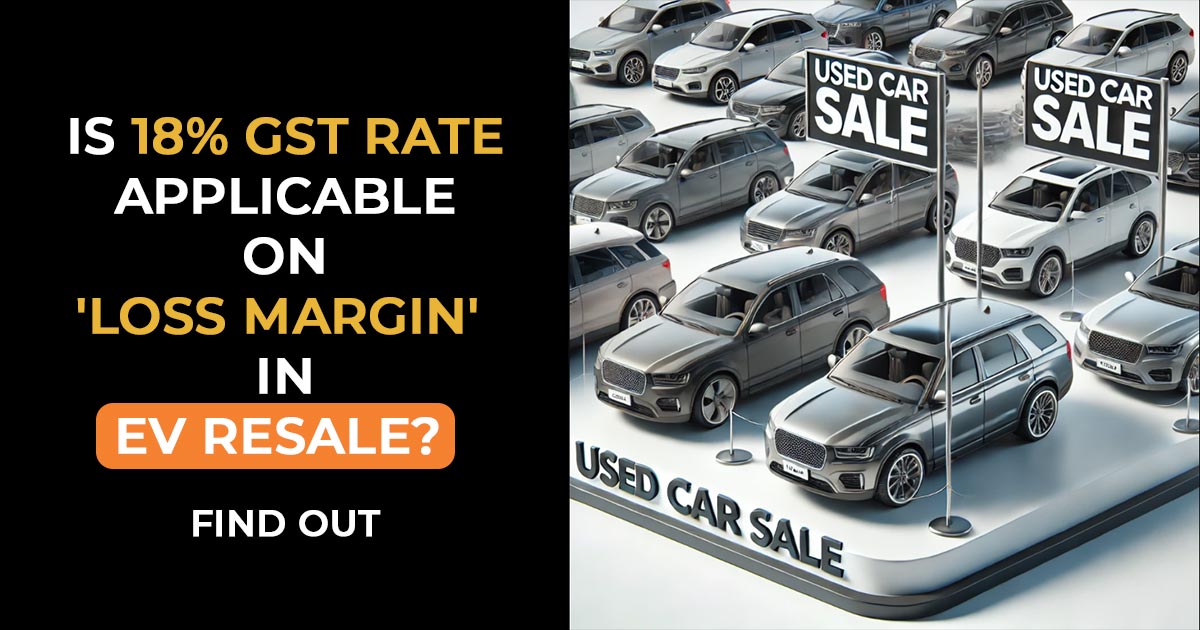
The decision of the Goods and Services Tax (GST) Council to charge an 18% tax on the resale of used electric vehicles (EVs) has made confusion. The explanation Finance Minister Nirmala Sitharaman who directed a tax on the margin value of resales has recommended that individuals selling their used cars shall be obligated to tax.
The businesses who are within the resale of the used vehicles shall be levied to tax and it is not on the private sellers.
GST council suggestions is there and the tax businesses shall not required to get paid on selling used cars.
GST Hike Confusion
The panel in the 55th GST Council meeting has approved the 18% GST on the used EVs sold via the businesses and replaces the earlier 12% rate.
When explaining that the tax would not be on the entire resale amount but only the margin value, Sitharaman expressed, “When the discussions happened, it was on that margin value… the margin value between purchased product price and resale price, on the margin only this 18 per cent is put.”
Through an example, she underscored that if a car was bought for Rs 12 lakh and resold as a used car for Rs 9 lakh, the price difference would be taxed.
The misunderstanding is that it appeared that people shall levy tax on reselling a car even after the resale shows a loss.
Easying GST on Used EVs
The council considered raising the GST on the used EVs to 18% on selling via businesses. But the same tax is levied on the margin value.
For example, if a used car dealer buys an EV for Rs 8 lakh and resells it for Rs 9 lakh, then the tax shall be applicable merely on a Rs 1 lakh profit margin. No tax will be imposed on the Direct transactions between individuals.
The same aligns with the tax structure for the used EVs with that of petrol and diesel vehicles that have bigger engine capacities, which are being imposed to tax at 18%.
Concluding the Same
GST Exemption for Individuals: No GST applies if you buy a car for Rs 12 lakh and sell it to another individual for Rs 9 lakh.
Understanding GST for Businesses: If a dealer purchases a car for Rs 8 lakh and sells the same for Rs 9 lakh then there will be an 18% GST which is applicable merely to Rs 1 lakh margin.
The clarification has arrived parallel to the official release of the council which notified that the motive of the decision was to standardise the tax treatment for all vehicles, including used petrol, diesel, and electric vehicles.
Implications of GST on Used Electric Vehicles (EVs)
Concern has been flashed from the decision that in the second-hand EV market, which may become not be attractive to buyers as of higher dealer margins being taxed.
A 5 per cent GST rate on new EVs shall be carried on to motivate the adoption, the transformation in taxation for the resold EVs can incur other hardships in promoting the usage of EVs.
Exemptions of GST
It was decided by the council that the aviation turbine fuel (ATF) shall not included in the “one-nation-one-tax” regime, retaining its taxation under the existing system.
Exempting GST has been suggested by the council on the contributions incurred via general insurance companies to the Motor Vehicle Accident (MVA) Fund. The fund is made under the Motor Vehicles Act, of 1988, which furnishes compensation and cashless treatment to victims of road accidents along with hit-and-run cases.
Important FAQs for Used Cars on Sale
Q.1 Is there any need to file the GST on selling my used car to an individual?
No, GST is not subject to be applicable if you sell your car to another person
Q.2 Will used car costs surge from the GST hike?
The GST hike if you purchase a car from a person does not influence the price. But buying from dealers or OLX or CarDekho platforms might be directed to higher costs as the GST is applicable before the margin of the dealer.
Q.3 What GST shall be imposed on used EVs?
To all used vehicles, including EVs and SUVs a standard 18% GST is now applicable.
Q.4 In what way is GST computed on the used cars?
Merely to the margin the GST is applicable-the difference between the selling cost and depreciated value. For example, if a car is bought for Rs 10 lakh and sold for Rs 15 lakh with a depreciated value of Rs 12 lakh, GST will be charged on the Rs 3 lakh margin.
Q.5 Who gets affected most by this GST hike?
The most impacted ones are the platforms and the dealers selling the used cars as the higher tax lessens the margins. Certain businesses may absorb the cost, and the other may pass the same to the buyers.
GST Hike Impact- For buyers: If you’re buying from an individual, prices stay unchanged. Purchases through the dealers may cost more
- For sellers: Individuals selling directly encounter zero impact
- For dealers: The hike raises costs, with the startups and dealers in the used car market facing hurdles
The hike in GST rate on used cars has the object of easing the tax slabs however draws diverse implications. It may raise the expense for businesses and the buyers using the platforms, but it can lessen the second-hand EV costs in certain matters giving upside potential to green mobility devotees.








